Digital Initiatives (MOE)
1. SWAYAM
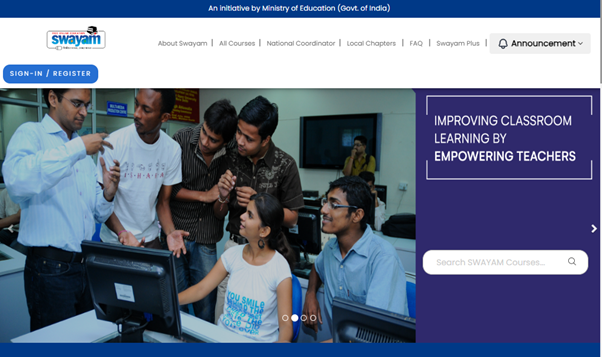
SWAYAM is a programme initiated by Government of India and designed to achieve the three cardinal principles of Education Policy viz., access, equity and quality. The objective of this effort is to take the best teaching learning resources to all, including the most disadvantaged. SWAYAM seeks to bridge the digital divide for students who have hitherto remained untouched by the digital revolution and have not been able to join the mainstream of the knowledge economy.
This is done through a platform that facilitates hosting of all the courses, taught in classrooms from Class 9 till post-graduation to be accessed by anyone, anywhere at any time. All the courses are interactive, prepared by the best teachers in the country and are available, free of cost to any learner. More than 1,000 specially chosen faculty and teachers from across the country have participated in preparing these courses.
The courses hosted on SWAYAM are in 4 quadrants – (1) video lecture, (2) specially prepared reading material that can be downloaded/printed (3) self-assessment tests through tests and quizzes and (4) an online discussion forum for clearing the doubts. Steps have been taken to enrich the learning experience by using audio-video and multi-media and state of the art pedagogy / technology.
https://swayam.gov.in/
2. SWAYAMPRABHA
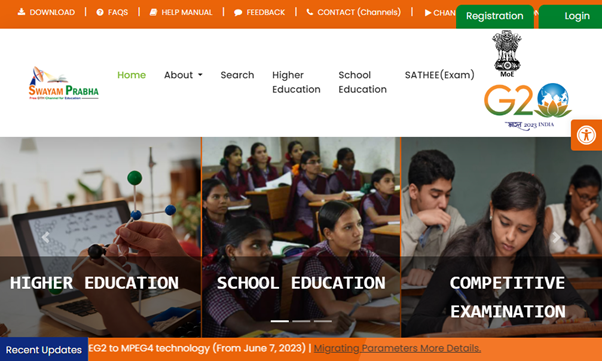
The SWAYAM PRABHA is a group of 40 DTH channels devoted to telecasting of high-quality educational programmes on 24X7 basis using the GSAT-15 satellite. Every day, there will be new content for at least (4) hours which would be repeated 5 more times in a day, allowing the students to choose the time of their convenience. The channels are uplinked from BISAG-N, Gandhinagar. The contents are provided by IITs, UGC, CEC, IGNOU. The INFLIBNET Centre maintains the web portal.
https://www.swayamprabha.gov.in/
3. National Digital Library
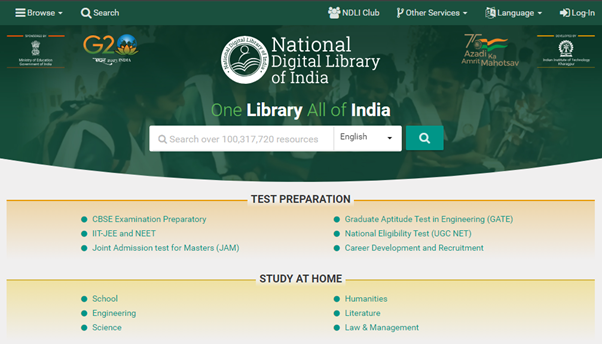
The National Digital library of India is a virtual repository of learning resources which is not just a repository with a search/browse facilities but also provides a host of services including textbooks, articles, videos, audiobooks, lectures, simulations, fiction, and all other kinds of learning media for the learners/users community. It is a project under Ministry of Education, Government of India, through its National Mission on Education through Information and Communication Technology (NMEICT). The objective is to collect and collate metadata and provide full text index from several national and international digital libraries, as well as other relevant sources. The NDLI provides free of cost access to many books and designed to hold content of any languages and provides interface support for 10 most widely used Indian languages. It is developed, operated and maintained by the Indian Institute of Technology Kharagpur.
https://ndl.iitkgp.ac.in/
4. e-PG Pathshala
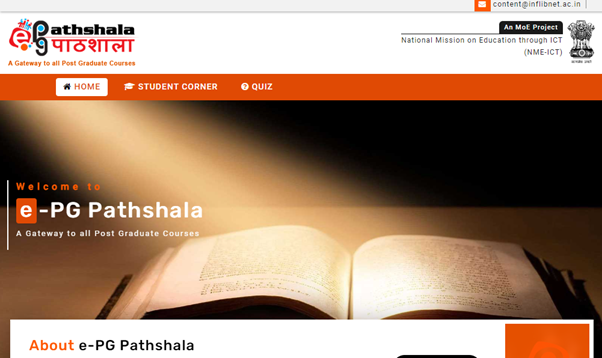
e-PG Pathshala is an initiative of the MHRD under its National Mission on Education through ICT (NME-ICT) being executed by the UGC. The content and its quality being the key component of education system, high quality, curriculum-based, interactive e-content in 70 subjects across all disciplines of social sciences, arts, fine arts and humanities, natural & mathematical sciences, linguistics and languages have been developed by the subject experts working in Indian universities and other R & D institutes across the country. Every subject had a team of principal investigator, paper coordinators, content writers, content reviewers, Language editors and multimedia team.
https://epgp.inflibnet.ac.in/
5. Shodhganga
About Shodhganga, INFLIBNET Centre
Shodhganga: a reservoir of Indian Theses
Theses and dissertations are known to be the rich and unique source of information, often the only source of research work that does not find its way into various publication channels. Theses and dissertations remain an un-tapped and under-utilized asset, leading to unnecessary duplication and repetition that, in effect, is the anti-theses of research and wastage of huge resources, both human and financial.
The UGC Notification (Minimum Standards & Procedure for Award of M.Phil. / Ph.D Degree, Regulation, 2009 Amendment made on 2016) dated 5th May 2016 mandates submission of electronic version of theses and dissertations by the researchers in universities with an aim to facilitate open access to Indian theses and dissertations to the academic community world-wide. Online availability of electronic theses through centrally-maintained digital repositories, not only ensure easy access and archiving of Indian doctoral theses but will also help in raising the standard and quality of research. This would overcome serious problem of duplication of research and poor quality resulting from the "poor visibility" and the "unseen" factor in research output. As per the Regulation, the responsibility of hosting, maintaining and making the digital repository of Indian Electronic Theses and Dissertation (called "Shodhganga"), accessible to all institutions and universities, is assigned to the INFLIBNET Centre.
"Shodhganga" is the name coined to denote digital repository of Indian Electronic Theses and Dissertations set-up by the INFLIBNET Centre. The word "Shodh" originates from Sanskrit and stands for research and discovery. The "Ganga" is the holiest, largest and longest of all rivers in Indian subcontinent. The Ganga is the symbol of India's age-long culture and civilisation, everchanging, ever-flowing, ever-loved and revered by its people, and has held India's heart captive and drawn uncounted millions to her banks since the dawn of history. Shodhganga stands for the reservoir of Indian intellectual output stored in a repository hosted and maintained by the INFLIBNET Centre.
The Shodhganga@INFLIBNET is set-up using an open source digital repository software called DSpace developed by MIT (Massachusetts Institute of Technology) in partnership between Hewlett- Packard (HP). The DSpace uses internationally recognized protocols and interoperability standards. Shodhganga provides a platform for research scholars to deposit their Ph.D. theses and make it available to the entire scholarly community in open access. The repository has the ability to capture, index, store, disseminate and preserve ETDs (Electronic Theses and Dissertations) submitted by the researchers.
DSpace supports "Open Archives Initiative's Protocol for Metadata Harvesting" (OAI-PMH) and uses a qualified version of the Dublin Core schema for its metadata. The INFLIBNET Centre, promotes setting-up of institutional and ETD repositories in member universities using OAI-PMH complaint software. A number of member universities have already set-up their institutional and ETD repositories using either DSpace or other OAI-PMH compliant Institutional Repository software. It would be possible for universities having sufficient network and computing infrastructure to maintain their own ETD repositories wherein their research scholars could deposit e-versions of their theses and dissertations. Moreover, they can use Shodhganga to host their theses as backup archives. INFLIBNET Centre, besides maintaining the Central ETD Repository (Shodhganga) would also deploy a central server to harvest the metadata from all such ETD repositories distributed in universities with an aim to provided unified access to theses and dissertations through its harvesting server.
Shodhganga replicates academic structure of each University in terms of Departments/ Centres/ Colleges each University has to facilitate ease of navigation. This structure facilitates research scholars from universities to deposit their theses in the respective Department / Centre / College. As shown in the Fig 1, option for simple search and advance search are available on the home page along with browsing facility through universities and departments. The Centre is also developing a semantic web-based interface to facilitate subject-based browsing, navigation, search and retrieval of content available in the repository.
https://shodhganga.inflibnet.ac.in/
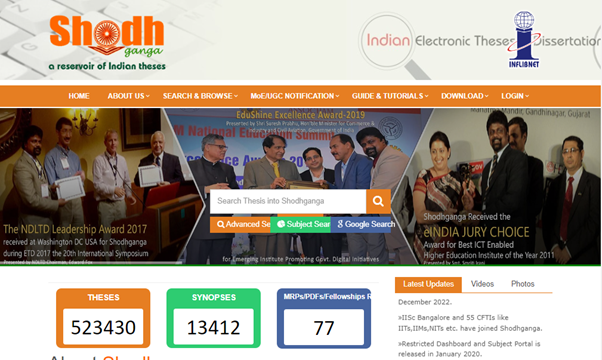
6. E-ShodhSindhu
Based on the recommendation of an Expert Committee, the Ministry of HRD (now renamed as Ministry of Education) has formed e-ShodhSindhu merging three consortia initiatives, namely UGC-INFONET Digital Library Consortium, NLIST and INDEST-AICTE Consortium.The e-ShodhSindhu will continue to provide current as well as archival access to more than 10,000 core and peer-reviewed journals and a number of bibliographic, citation and factual databases in different disciplines from a large number of publishers and aggregators to its member institutions including centrally-funded technical institutions, universities and colleges that are covered under 12(B) and 2(f) Sections of the UGC Act.
https://ess.inflibnet.ac.in/
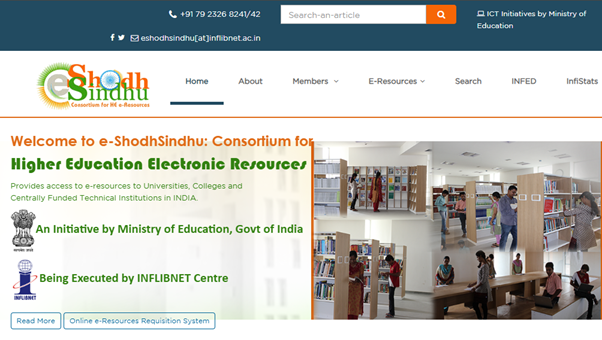
7. e-Yantra
e-Yantra is a robotics outreach program funded by the Ministry of Education and hosted at IIT Bombay. The goal is to harness the talent of young engineers to solve problems using technology across a variety of domains such as: agriculture, manufacturing, defence, home, smart-city maintenance and service industries.
https://www.e-yantra.org/
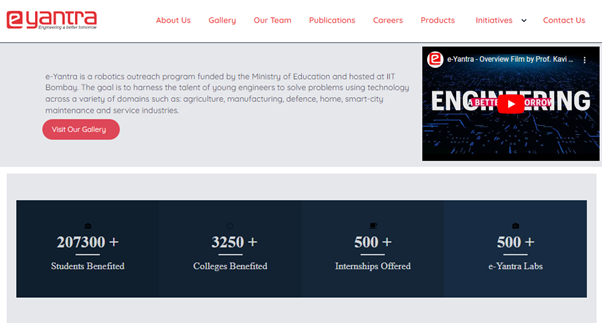
8. FOSSEE
FOSSEE (Free/Libre and Open Source Software for Education) project promotes the use of FLOSS tools to improve the quality of education in our country. We aim to reduce dependency on proprietary software in educational institutions. We encourage the use of FLOSS tools through various activities to ensure commercial software is replaced by equivalent FLOSS tools. We also develop new FLOSS tools and upgrade existing tools to meet requirements in academia and research. The FOSSEE project is part of the National Mission on Education through Information and Communication Technology (ICT), Ministry of Education (MoE), Government of India.
https://fossee.in/
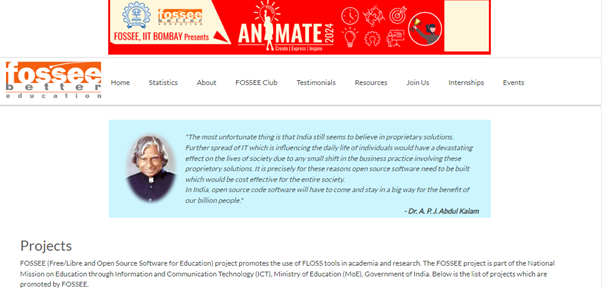
9. Spoken Tutorial
Spoken Tutorial is a multi-award-winning educational content portal. Here one can learn various Free and Open-Source Software all by oneself. Our self-paced, multi-lingual courses ensure that anybody with a computer and a desire for learning, can learn from any place, at any time and in a language of their choice. All the content published on this website are shared under the CC BY SA license.
Our courses are simple and easy to follow even for a beginner but they also meet the growing needs of the learner. Our engaging digital content ensures that learning happens at all levels - Basic, Intermediate and Advanced. Our content mandates side-by-side practice thereby ensuring that learners are actively learning. Many of the software taught, are used in various disciplines of Engineering, pure Sciences and several other Under-Grad and Post-Grad studies, and can be extended to Commerce, Arts and Management streams as well. Alongside these, there are some courses relevant at School level, too, which help school students to visualise difficult concepts of Math and Science. These can also be used by Teachers to prepare lesson plans, explain abstract concepts and give digital assignments to students.
The learning can happen in an organised manner as well. Faculty in institutes can organise their batch of students into groups, who will learn a particular software course for an entire semester. The ST course can be mapped to the Course/Lab manuals and systematic learning can take place. If the academic timetable permits, then a single student can learn upto 3 different ST courses in one semester during the designated academic Lab hours.
https://spoken-tutorial.org/about-us/
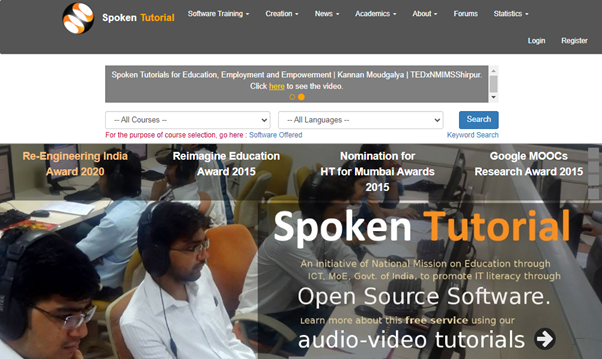
10. Virtual Labs
Virtual Labs project is an initiative of Ministry of Education (MoE), Government of India under the aegis of National Mission on Education through Information and Communication Technology (NMEICT). This project is a consortium activity of twelve participating institutes and IIT Delhi is coordinating institute. It is a paradigm shift in ICT-based education. For the first time, such an initiative has been taken-up in remote‐experimentation. Under Virtual Labs project, over 100 Virtual Labs consisting of approximately 700+ web-enabled experiments were designed for remote-operation and viewing.
https://www.vlab.co.in/
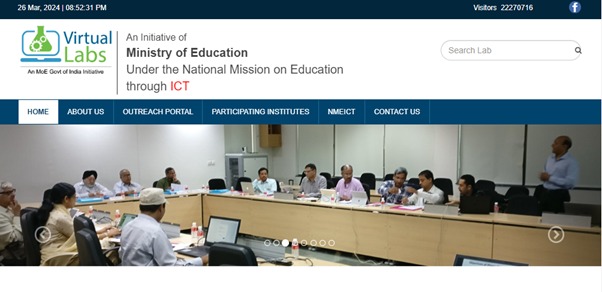
11. National Internship Portal
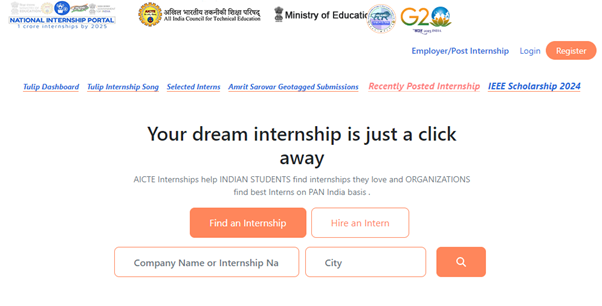
https://internship.aicte-india.org/
12. National Educational Alliance for Technology
MoE has announced a National Educational Alliance for Technology (NEAT) as a Public-Private partnership model between the Government (through its implementing agency AICTE) and the Education Technology companies of India. Through an open invitation and screening, companies are invited to showcase their products on a National Portal developed for the learners, who may procure them based on their requirements.
The aim of NEAT is to bring the best technological Products in education pedagogy on a single platform for the convenience of learners. Technology Products using Artificial Intelligence for customized learning or e-content in niche areas having highly employable skills would be identified for showcasing on the portal.
The scheme also includes free seats for existing students of higher education from Weaker sections of society. The distribution of free seats would be done through the NEAT portal, based on student information shared by Educational Institutions. During the first phase, the portal would be launched as a pilot phase in AICTE approved Government Colleges of India only.
https://neat.aicte-india.org/
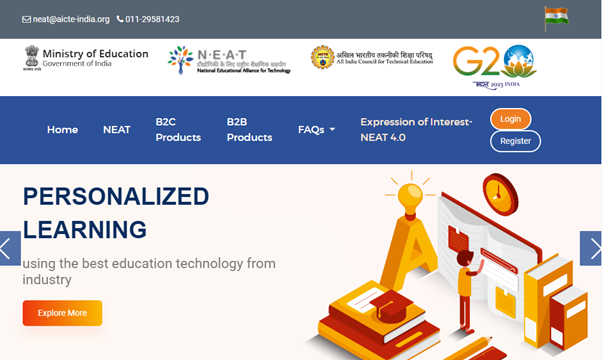
13. University Enterprise Resource Planning (SAMARTH)
"Samarth" is an initiative by the Ministry of Education started in 2019, under the National Mission on Education through Information and Communication Technology NMEICT-II (now NMEICT-III), with an aim to enable the universities and Higher Education Institutions (HEIs) through a digital framework for planning, management, delivery, and monitoring of services for students, staff, and other stakeholders. Under the project, the HEIs are provided with a fully managed, cloud based, comprehensive ERP that is custom built for HEIs of the country.
Samarth blends technology with policies and standards of governance in higher education and makes it available to the institution and its stakeholders through anytime-anywhere digital interfaces. Institutions can deliver quality higher education experience to learners by simplifying their procedures and practices through Samarth’s digital interfaces.
Since 2019, Samarth has been extended to various types of Higher Education Institutions including Central Universities, State Universities, Colleges, NITs, IIITs, IIM, IISER, and other Institutions of National Importance. With a pan-India presence, Samarth is building a nationwide network of future ready digital campuses providing world-class yet uniform experience to students and administrators of institutions.
Under Samarth initiative, an open source and open standards enabled evolutionary process automation engine is provided to Universities and HEIs to drive their digital transformation. The initiative provides a gamut of digital tools that are integrated in an online platform of best practices for efficient resource planning and management, process and service improvement, and good governance in higher education.
The Samarth e-governance platform integrates technology and education delivery in a seamless manner. It is custom-made for Higher Education Institutions (HEIs) across the country and allows them to deploy a digital framework for planning, management, delivery and monitoring of services for students, staff and other stakeholders. It caters to the needs of Universities and HEIs by introducing 9 packages comprising of 40+ modules on a single platform. The modules help Institutions to streamline their repository of records: starting from admission details to examination, employee and leave data, payroll and administrative information amongst others. Designed after a careful study and understanding of University rules and systems, they present an integrated system of records and data. Moreover, the modules are user friendly and constant research and feedback is carried out to enhance user experience and add new or additional features.
Samarth E-Gov Suite is a catalyst in the transformation of Higher Education institutions transitioning towards a future ready digital campus.
https://samarth.edu.in/
.png)
14. VIDWAN
VIDWAN is the premier database of profiles of scientists / researchers and other faculty members working at leading academic institutions and other R & D organisation involved in teaching and research in India. It provides important information about expert's background, contact address, experience, scholarly publications, skills and accomplishments, researcher identity, etc. The database developed and maintained by Information and Library Network Centre (INFLIBNET) with financial support from the National Mission on Education through ICT (NME-ICT). The database would be instrumental in selection of panels of experts for various committees, taskforce, established by the Ministries / Govt. establishments for monitoring and evaluation purposes.
https://vidwan.inflibnet.ac.in/
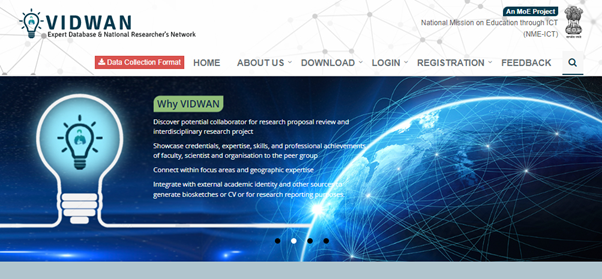













.png)
